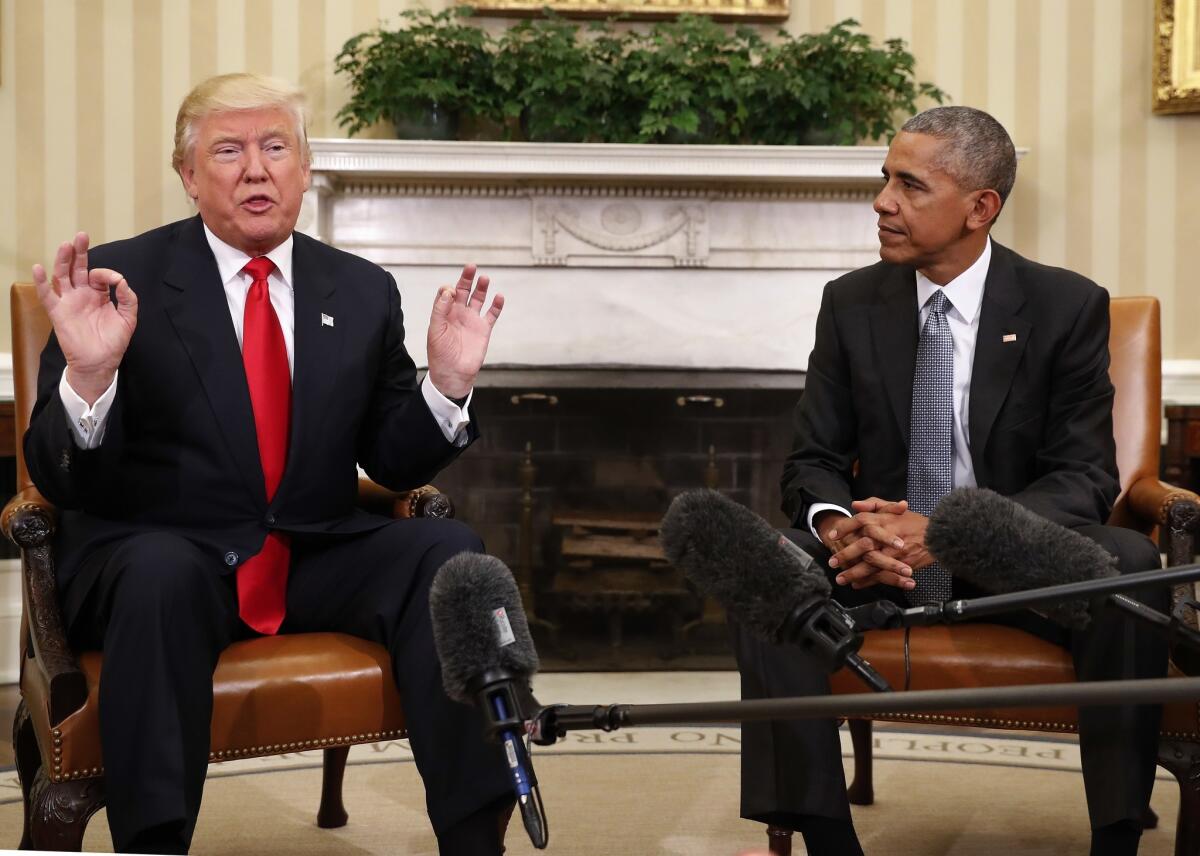Silicon Valley searches for the Trump playbook

- Share via
As the White House prepares to usher in a new president, the technology industry finds itself staring into the unknown.
Donald Trump’s campaign had no position on supporting the start-up community. No plan for dealing with artificial intelligence. No policies governing open data. And that doesn’t even get to the heart of the industry’s concerns about his social policy agenda.
Despite their near-united opposition to Trump’s candidacy, tech industry leaders now more than ever must take a proactive role in engaging with government, tech policy experts said.
“Trump said a lot of nasty, unsavory things, and people understandably think the worst,” said Garrett Johnson, who co-founded tech advocacy group Lincoln Labs with other Silicon Valley Republicans. “Both sides need to extend olive branches.”
In some ways, the conciliation already has begun. Chief executives who labeled Trump a fear monger and threat to democracy wrote to their dismayed workers the day after the election, promising to work with the country’s new leadership.
Trump’s political allies say his policy goals would boost all industries, and that issues unique to the tech industry such as digital privacy and cybersecurity will get fair consideration.
And those who aren’t convinced have shifted into a “roll-up-the-sleeves” mode, according to Mike Hettinger, managing principal at lobbying firm Hettinger Strategy Group, who said many companies are hoping that Trump will meet them halfway.
Trump’s transition team includes Peter Thiel, the billionaire Silicon Valley investor and Facebook board member. The role could give Thiel considerable sway in determining Trump’s priorities and staff.
But even that has been a contentious move, because Thiel has been shunned by some in the Valley for backing Trump’s campaign. Others say Thiel’s support for Trump has put him in prime position to help shape Trump’s tech policies.
“Whether or not you agree with Thiel’s choice, he had a point of view, he put himself out there and he had an impact,” said Bradley Tusk, a political strategist advising tech companies. “If we want to see policies that are pro-innovation, you’ve got to be in the game.”
Many policies advocated by the tech industry don’t split along party lines. That gives industry groups and policy experts optimism in finding shared ground with Trump officials on online data storage rules, intellectual property protections and patent reform.
“Applying technology to scale and speed solutions is the DNA of our country’s tech industry,” said Blair Christie, the former head of worldwide government affairs at networking giant Cisco Systems. “I have always believed this fact alone implies government and the private sector have a common agenda.”
Still, there will be tension, especially as the ambitions of Silicon Valley run up against Trump’s plans for the country. For example, Apple, Alphabet, Amazon.com and many others are developing programs that think on their own and eliminate routine human tasks.
“If you think people are upset because they’ve lost jobs to free trade, wait until they start losing jobs to” artificial intelligence, said Justin Hamilton, a political advisor to tech companies who worked in the Obama administration.
Entrepreneurs including SpaceX and Tesla Motors CEO Elon Musk have suggested a government-provided basic income could be a way to respond to increasing automation.
Getting Trump to back such an idea could come down to preserving the lines of communication Obama established. From showcasing start-ups at the White House to installing officials in Silicon Valley, Obama showed openness to envelope-pushing ideas.
That’s where political advisors come into play -- a move that paid off for several companies in recent years.
Uber hired former Obama campaign manager David Plouffe to guide political strategy. That led to “a real change” in how local state and federal government perceived the San Francisco start-up, Hamilton said.
Many companies employ former Republican staffers, but political experts expect more to cross over as the tech industry tries to expand its influence in the new GOP administration. But until Trump details his tech plans, the industry is left to cross its fingers and hope.
“Obama’s genuine passion and commitment for technology animated so much of what we did in government,” said Nicole Wong, former U.S. deputy chief technology officer under Obama. “It’s hard to think they would turn back from the last eight years.”
Twitter: @peard33, @traceylien
ALSO
GrubHub faces backlash after CEO’s anti-Trump email to employees
After Trump’s win, even some in Silicon Valley wonder: Has Facebook grown too influential?
What will a President Trump mean for SoCal housing and L.A.’s building boom?





